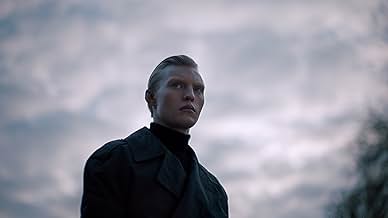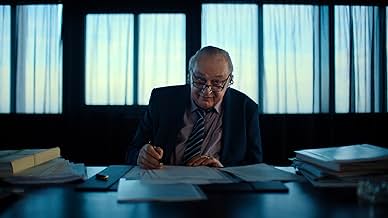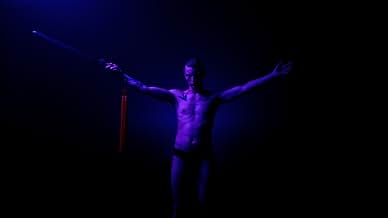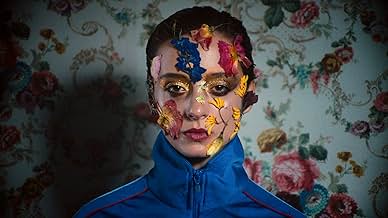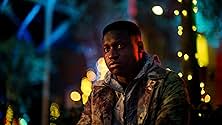Eine junge Heldin, Miu, die durch die kriminelle Unterwelt Kopenhagens reist.Eine junge Heldin, Miu, die durch die kriminelle Unterwelt Kopenhagens reist.Eine junge Heldin, Miu, die durch die kriminelle Unterwelt Kopenhagens reist.
Folgen durchsuchen
Empfohlene Bewertungen
Ambitious miniseries with beautiful shots throughout and atmospheric lighting. The neon lights, production value and overly long silences were the highlights of the series. I was pulled into a strange world where I absolutely couldn't tell where it was going. The first two episodes require patience, however once you are into the story, Copenhagen Cowboy is something new and engaging.
The colours and cinematography are beautiful in a harsh environment. It's slow - sometimes very slow - but once you enter the meditative state, it makes sense. Though it has dark storytelling and violent characters, there's ample of hope and kindness involved as well.
The technical brilliance in the direction, cinematography and score can't really be denied. The reliance on specific shots - static camera, 360 degree pans, slow zoom is highly effective and everything is calculated to build maximum tension.
However, I feel like, it could easily have been a 2 hour film instead of a miniseries as it would've been fast paced and wouldn't even miss any story elements.
The colours and cinematography are beautiful in a harsh environment. It's slow - sometimes very slow - but once you enter the meditative state, it makes sense. Though it has dark storytelling and violent characters, there's ample of hope and kindness involved as well.
The technical brilliance in the direction, cinematography and score can't really be denied. The reliance on specific shots - static camera, 360 degree pans, slow zoom is highly effective and everything is calculated to build maximum tension.
However, I feel like, it could easily have been a 2 hour film instead of a miniseries as it would've been fast paced and wouldn't even miss any story elements.
It's great, and rare, to be presented with a TV show that leaves you wondering for hours and days afterwards if it's any good. This is something to be cherished, especially in an entertainment world chock full of formulaic drabness built on algorithms, fan service and commercialism.
Copenhagen Cowboy (a terrible title to be fair), even more than Refn's divisive Only God Forgives, is a death dream with a very loose narrative woven together with a smorgasbord of ideas and styles inspired by the mysticism and folklore from multiple cultures. It's a dizzying and head-scratching six episodes to which it's pointless to try to ascribe too much plot or even thematic analysis. Some will argue that there's just not enough going on to justify any sort of runtime longer than 90mins but the fact is that anyone who hates this is a series would hate it just as much as a movie.
It's at points breathtaking to behold, and utterly infuriating at others. The reliance on specific shots - static camera, 360-degree pans, slow zoom - is highly effective at points and annoying at others - but everything is calculated to build maximum tension and suspense, and serves to really bring the few scenes that aren't filmed in this way to the viewer's attention as being significant.
The technical brilliance in the direction, cinematography and score can't really be denied, even if it's not to your taste. Every actor is riveting, especially Angela Bundalovic who as the enigmatic Miu delivers a movingly minimalistic, affecting, and extraordinarily physical performance in spite of her diminutive size.
Love it or hate it, Copenhagen Cowboy is an experience. It's not style over substance - the substance is by and large the style itself, so if the style isn't for you then you'll certainly find yourself at sea. In coming to a conclusion of whether I liked it or not, I realised I could only think of a couple of people I'd recommend it to. And because those people are my favourite people who I trust the most, I figure it's something I definitely liked and enjoyed. Go make your own mind up...
Copenhagen Cowboy (a terrible title to be fair), even more than Refn's divisive Only God Forgives, is a death dream with a very loose narrative woven together with a smorgasbord of ideas and styles inspired by the mysticism and folklore from multiple cultures. It's a dizzying and head-scratching six episodes to which it's pointless to try to ascribe too much plot or even thematic analysis. Some will argue that there's just not enough going on to justify any sort of runtime longer than 90mins but the fact is that anyone who hates this is a series would hate it just as much as a movie.
It's at points breathtaking to behold, and utterly infuriating at others. The reliance on specific shots - static camera, 360-degree pans, slow zoom - is highly effective at points and annoying at others - but everything is calculated to build maximum tension and suspense, and serves to really bring the few scenes that aren't filmed in this way to the viewer's attention as being significant.
The technical brilliance in the direction, cinematography and score can't really be denied, even if it's not to your taste. Every actor is riveting, especially Angela Bundalovic who as the enigmatic Miu delivers a movingly minimalistic, affecting, and extraordinarily physical performance in spite of her diminutive size.
Love it or hate it, Copenhagen Cowboy is an experience. It's not style over substance - the substance is by and large the style itself, so if the style isn't for you then you'll certainly find yourself at sea. In coming to a conclusion of whether I liked it or not, I realised I could only think of a couple of people I'd recommend it to. And because those people are my favourite people who I trust the most, I figure it's something I definitely liked and enjoyed. Go make your own mind up...
This incoherent mini-series could easily have been a 90 minute movie and we wouldn't have missed any story elements. It would have been fast paced, but you wouldn't feel the urge to hit the fast-forward button, as I did.
There's a not a lot that make sense in 'Copenhagen Cowboy'. We are introduced to a wide array of characters who are somehow all connected and tied to the underworld, but most character arcs are left uncompleted. In the center of it all there's the emotionless protagonist with zero chemistry.
It's a shame that NWR focuses more on cool-looking neonlit shots, and slow moving 360 degree pans than telling an engaging story, because I prefer substance over style. Style should be the icing on the cake and serve the story, not the opposite.
There's a not a lot that make sense in 'Copenhagen Cowboy'. We are introduced to a wide array of characters who are somehow all connected and tied to the underworld, but most character arcs are left uncompleted. In the center of it all there's the emotionless protagonist with zero chemistry.
It's a shame that NWR focuses more on cool-looking neonlit shots, and slow moving 360 degree pans than telling an engaging story, because I prefer substance over style. Style should be the icing on the cake and serve the story, not the opposite.
Copenhagen Cowboy may be one of the most plodding shows ever put on Netflix, but as per usual for Nicolas Winding Refn (presenting his first Danish-speaking project since the Pusher films), there are both mystical and purely visual aspects to keep you transfixed.
As I noted in my review of Too Old to Die Young, this is not a director who simply points the lights and cameras at the actors and hits "record". This is a director who knows how to make a significant prop glow a hellish red in an otherwise purple frame; one who plans his outdoor shots so that the twilight has just the right shade and intensity; one who knows how to frame his actors so that the kaleidoscopic city behind them seems both dead and alive at the same time... Even among other directors who fancy neon-drenched '80s nostalgia and Neo-noir ambiance, Refn sticks out as an especially deliberate filmmaker.
What makes Copenhagen Cowboy particularly interesting is that it plays like an atonement for the directors' past machismo narratives (unintentionally or not, his various Gosling characters have become "Sigma Male" icons) and lack of female representation. Doubly fascinating is the lead herself, Angela Bundalovic as the mysterious and possibly undead Miu, who Jasper Rees (writing for The Telegraph) described as "an unsexualized androgyne exuding an enigmatic potency", and that, at every other turn, the camera seems to be trying to gaze into her soul -- to figure out just who or what she is.
His reading is that she may be a vampire, a sprite, or some sort of angel that (as she moves through the criminal underworld of Denmark, starting in a sex-slave den and ending up amongst corrupt lawyers and chauvinist millionaires) has been sent to avenge the female sex. He describes her enemies: "a Serbian pimp, a Chinese crime boss, a Danish lord of the manor who preaches the primal power of the cock to his murderous son."
I agree that Copenhagen Cowboy has a lot to chew on in terms of themes, even if the show as such can be a slog to watch. The boredom is, of course, alleviated by the visuals and music (and sometimes the humor, particularly when Refn himself appears and when Zlatko Buric converses with a celebrity guest I won't unveil here), but I understand if some viewers won't think it's worth it.
As for my more local -- Scandinavian -- papers, it seems Refn's return to the Nordic region isn't cause for too much celebration; verdicts have ranged from "sluggish as syrup" to complaints that it's nightmarish, nasty, brutal, and whatever else. One blogger wrote, "I don't think I've ever seen so many horrible people of so many different genders and cultural backgrounds doing horrible things". Of course, to me, that's rather like complaining that there are cars in the Fast and the Furious films.
There is one thing about Copenhagen Cowboy that unnerves me more than anything else, however, and it has to do with the pigs that keep appearing throughout the show. It's not that I have trouble figuring out the meaning of said hogs; what it is they either symbolize or poke fun at. Instead, my issue is this:
A few years ago, I decided to use the GTA V "Director Mode" to create a short film in the style of Nicolas Winding Refn (complete with synth-heavy music from Drive, Only God Forgives, The Neon Demon, and his The Wicked Die Young album). It was named Butcher vs. Pig-Man and told the story of a pig who escaped from its farm and -- since "animals are people too" -- grew up into a vengeful pig-man, played by one of the player characters in a pig mask and speaking entirely in pig noises.
And now, here's Nicolas Winding Refn, making a show that heavily features pigs and, yes, a pervy guy who speaks in pig squeals. I'm not saying Refn has seen my video (hardly anyone has), but this is a weirdly specific coincidence. I might've considered asking for royalties if the video wasn't full of unoriginal sh-t anyway.
As I noted in my review of Too Old to Die Young, this is not a director who simply points the lights and cameras at the actors and hits "record". This is a director who knows how to make a significant prop glow a hellish red in an otherwise purple frame; one who plans his outdoor shots so that the twilight has just the right shade and intensity; one who knows how to frame his actors so that the kaleidoscopic city behind them seems both dead and alive at the same time... Even among other directors who fancy neon-drenched '80s nostalgia and Neo-noir ambiance, Refn sticks out as an especially deliberate filmmaker.
What makes Copenhagen Cowboy particularly interesting is that it plays like an atonement for the directors' past machismo narratives (unintentionally or not, his various Gosling characters have become "Sigma Male" icons) and lack of female representation. Doubly fascinating is the lead herself, Angela Bundalovic as the mysterious and possibly undead Miu, who Jasper Rees (writing for The Telegraph) described as "an unsexualized androgyne exuding an enigmatic potency", and that, at every other turn, the camera seems to be trying to gaze into her soul -- to figure out just who or what she is.
His reading is that she may be a vampire, a sprite, or some sort of angel that (as she moves through the criminal underworld of Denmark, starting in a sex-slave den and ending up amongst corrupt lawyers and chauvinist millionaires) has been sent to avenge the female sex. He describes her enemies: "a Serbian pimp, a Chinese crime boss, a Danish lord of the manor who preaches the primal power of the cock to his murderous son."
I agree that Copenhagen Cowboy has a lot to chew on in terms of themes, even if the show as such can be a slog to watch. The boredom is, of course, alleviated by the visuals and music (and sometimes the humor, particularly when Refn himself appears and when Zlatko Buric converses with a celebrity guest I won't unveil here), but I understand if some viewers won't think it's worth it.
As for my more local -- Scandinavian -- papers, it seems Refn's return to the Nordic region isn't cause for too much celebration; verdicts have ranged from "sluggish as syrup" to complaints that it's nightmarish, nasty, brutal, and whatever else. One blogger wrote, "I don't think I've ever seen so many horrible people of so many different genders and cultural backgrounds doing horrible things". Of course, to me, that's rather like complaining that there are cars in the Fast and the Furious films.
There is one thing about Copenhagen Cowboy that unnerves me more than anything else, however, and it has to do with the pigs that keep appearing throughout the show. It's not that I have trouble figuring out the meaning of said hogs; what it is they either symbolize or poke fun at. Instead, my issue is this:
A few years ago, I decided to use the GTA V "Director Mode" to create a short film in the style of Nicolas Winding Refn (complete with synth-heavy music from Drive, Only God Forgives, The Neon Demon, and his The Wicked Die Young album). It was named Butcher vs. Pig-Man and told the story of a pig who escaped from its farm and -- since "animals are people too" -- grew up into a vengeful pig-man, played by one of the player characters in a pig mask and speaking entirely in pig noises.
And now, here's Nicolas Winding Refn, making a show that heavily features pigs and, yes, a pervy guy who speaks in pig squeals. I'm not saying Refn has seen my video (hardly anyone has), but this is a weirdly specific coincidence. I might've considered asking for royalties if the video wasn't full of unoriginal sh-t anyway.
Fortunately, that means all 6 episodes of 'Copenhagen Cowboy' are gorgeous to behold even when the narrative is seemingly skimming the borders of interesting areas to explore (and subsequently explain).
Anyone familiar with the director's oeuvre will know what to expect, but he still manages to bring something fresh to each episode with trademark camera flair. Tracking shots and slow pans are good, and I particularly liked his use of the 360 degree camera; it stylishly captured conversations, environments, and specific events with a smoothness that lulled you into acceptance of the show's pacing.
I'm not sure I understood everything the story was trying to do, especially in the final episode where it took on more Lynchian dreamlike qualities with supernatural flourishes, but there was always good moments sprinkled throughout, and the visuals were never less than stunning. Neon-drenched might sound cliche, but it's apt for describing Winding Refn's affinity for lighting a scene with almost otherworldly bluish hues and moody reds. Combine this with a synth score that always seems to be evolving from episode to episode and it's hard not to become enraptured by the audiovisual experience on offer. It's a tidal wave of style, so just sit back and ride it, basically.
So the cinematography, soundtrack, and stately pace are all signature elements of the director, but what about the ultra-violence so common in his work? It's graphic on occasion, but nothing like we've seen before. However, the fight sequences, though brief, are great. The choreography is simple, elegant, and augmented by the sound design, while the characters fight almost robotically. It's different, but also effective, and suits the characters involved as they are all quite emotionally reserved. Plus that final fight in the finale is arguably one of the most stylish sequences I've seen for some time; the way the sound design is integrated and the way the lighting enhances the framing is glorious.
Overall, 'Copenhagen Cowboy' leaves its narrative wide open for a second season it probably won't get, which is a shame, because even though I didn't love this, there's much to like, and certainly room to improve. Nicolas Winding Refn shows off everything that makes him a uniquely stylish director in the industry, imbuing every frame with something entrancing to soak in and showing real quality with use of camera, and though the story needed more work, there's few series's out there that look and sound this good.
7/10.
Anyone familiar with the director's oeuvre will know what to expect, but he still manages to bring something fresh to each episode with trademark camera flair. Tracking shots and slow pans are good, and I particularly liked his use of the 360 degree camera; it stylishly captured conversations, environments, and specific events with a smoothness that lulled you into acceptance of the show's pacing.
I'm not sure I understood everything the story was trying to do, especially in the final episode where it took on more Lynchian dreamlike qualities with supernatural flourishes, but there was always good moments sprinkled throughout, and the visuals were never less than stunning. Neon-drenched might sound cliche, but it's apt for describing Winding Refn's affinity for lighting a scene with almost otherworldly bluish hues and moody reds. Combine this with a synth score that always seems to be evolving from episode to episode and it's hard not to become enraptured by the audiovisual experience on offer. It's a tidal wave of style, so just sit back and ride it, basically.
So the cinematography, soundtrack, and stately pace are all signature elements of the director, but what about the ultra-violence so common in his work? It's graphic on occasion, but nothing like we've seen before. However, the fight sequences, though brief, are great. The choreography is simple, elegant, and augmented by the sound design, while the characters fight almost robotically. It's different, but also effective, and suits the characters involved as they are all quite emotionally reserved. Plus that final fight in the finale is arguably one of the most stylish sequences I've seen for some time; the way the sound design is integrated and the way the lighting enhances the framing is glorious.
Overall, 'Copenhagen Cowboy' leaves its narrative wide open for a second season it probably won't get, which is a shame, because even though I didn't love this, there's much to like, and certainly room to improve. Nicolas Winding Refn shows off everything that makes him a uniquely stylish director in the industry, imbuing every frame with something entrancing to soak in and showing real quality with use of camera, and though the story needed more work, there's few series's out there that look and sound this good.
7/10.
Wusstest du schon
- WissenswertesFirst work by Nicolas Winding Refn since Pusher III (2005) to star Zlatko Buric. It's their fifth director-actor collaboration.
- VerbindungenReferenced in Film Junk Podcast: Episode 904: Barbie + Oppenheimer (2023)
Top-Auswahl
Melde dich zum Bewerten an und greife auf die Watchlist für personalisierte Empfehlungen zu.
- How many seasons does Copenhagen Cowboy have?Powered by Alexa
Details
- Erscheinungsdatum
- Herkunftsland
- Offizieller Standort
- Sprachen
- Auch bekannt als
- Ковбой із Копенгагена
- Drehorte
- Produktionsfirmen
- Weitere beteiligte Unternehmen bei IMDbPro anzeigen
- Farbe
- Sound-Mix
Zu dieser Seite beitragen
Bearbeitung vorschlagen oder fehlenden Inhalt hinzufügen



